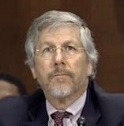ODNI’s Litt welcomes ‘transparency’ but defends IC’s sources and methods

In an appearance he made on March 18 at the “Freedom of Information Day” celebration at American University’s law school, Robert Litt, the general counsel for the Office of the Director of National Intelligence (ODNI) said the public’s current quest for “transparency” in the Intelligence Community should not be pursued to the point that it threatens national security.
“In the long run, our ability to protect the public requires that we have the public’s support,” Litt acknowledged. “But lines must be drawn.”
“First and foremost, we cannot allow transparency to compromise our sources and methods. We must continue to protect the specific targets of our intelligence collection, the specific methods by which we accomplish that collection, and the specifics of the intelligence we collect.”
He cited an example in which the nation would be harmed if too much information was disclosed about the Intelligence Community’s use of specific sources and methods.
“Were we to announce to the world that we have the ability, for example, to intercept emails sent using particular email services,” Litt pointed out, “we would help terrorists, cyber criminals, foreign intelligence officers and other foreign intelligence targets communicate without fear of detection.”
Litt told his audience that much of the public discussion about the NSA’s surveillance activities has failed to distinguish among what the Intelligence Community can do technically, what it can do legally and what it actually does do.
“The recent discussion has focused on technical capabilities — which are often fascinating and, quite frankly, amazing — while leaving a misleading impression of actual activities,” Litt observed.
“For example, there have been press reports that NSA has engaged in a concerted effort to break encryption. Without commenting on the accuracy of any particular story . . . isn’t that exactly what intelligence agencies have historically done, and what they are supposed to do? We know that our enemies use encryption and other techniques precisely to avoid surveillance; NSA’s job is to figure out how to break those techniques, and its capabilities are unmatched. But saying that NSA can break encryption is different from saying that they routinely spy on encrypted conversations of ordinary Americans or foreigners. They don’t.”








